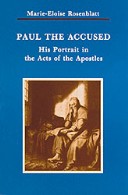Michael Glazier Books: Zacchaeus Studies, New Testament S.
1 total work
Two major assumptions underlie most current interpretations of Acts. The first is that, in Acts, Luke is asking for acceptance of the Church by the Roman authorities. The second is that the theological aim of Luke's narrative is to demonstrate the passing of God's revelation from Judaism to the Church. This book turns these assumptions on their heels. By focusing on Paul as Luke presents him - as witness and accused - Luke's objective of dramatizing the movement of the Gospel from a religous to a secular sphere emerges. The Gospel is to be spread "to the ends of the world". Through Paul, Luke assists the early Christian community in persevering through present trials and in focusing on a global, missionary future. Paul never abandons his Jewishness, nor does he look to Rome for guidance. He merely serves as a witness to the inevitable emergence of Christianity onto the secular scene. The members of the Church, like Paul, may suffer accusation, trial and imprisonment, but the Gospel message, the unstoppable message of ressurection, will continue to spread.
